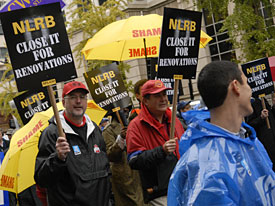
In what seems to be more evidence of the National Labor Relations Board’s pro-union leanings, a recent letter to members of Pennsylvania’s congressional delegation details what appears to be certain conflicts of interest by the regional director of the National Labor Relations Board (NLRB) office in Philadelphia, including fundraising from unions and pro-union law firms.
As a long-time union advocate, former NLRB member Dennis Walsh was appointed to head the NLRB’s Philadelphia office as reginal director in 2013.
As director of the NLRB’s Region 4, Walsh and his office are “responsible for enforcement of the nation’s primary labor law covering private sector employees in the jurisdiction of Region 4, which serves 22 counties in eastern Pennsylvania, 8 counties in southern New Jersey, and 1 county in Delaware.”
In spite of his role with the NLRB, however, Walsh’s service as chairman of the pro-union Peggy Browning Fund (PBF) is what raises questions about his “impartiality,” according to Philadelphia labor lawyer Wally Zimolong.
Mr. Walsh’s role as chairman of a union funded pro-union/worker’s rights organization known as the Peggy Browning Fund (“PBF”) and his potential solicitation of donations from labor organizations having business before the NLRB Region 4 is at best an implicit conflict of interest that shakes the public trust and at worst a violation of federal laws, 5 U.S.C. § 7321, et. seq. (the “Hatch Act”) and 26 C.F.R. Part 2635.
According to its website, the “mission of the Peggy Browning Fund (PBF) is to educate and inspire the next generation of law students to become advocates for workplace justice.”
“THE PBF is a union activist organization funded solely with donations from organized labor,” writes Zimolong. “Indeed, the PBF website’s ‘Latest News’ section includes a headline stating ‘United Steelworkers and Peggy Browning Fund – A Close Relationship.’ The PBF’s signature event is a ‘Worker’s Rights Conference.’ One of the stated goals of the Conference is ‘organizing low wage workers.'”
In addition to Walsh, who serves as the PBF’s chairman, the PBF’s board of directors includes union presidents and is advised by union staffers from the AFL-CIO, AFSCME and others.
As Walsh and his agency hears cases involving labor unions, “Mr. Walsh has been involved with hundreds of matters involving unions that he has a relationship with through PBF,” notes Zimolong.
Moreover, Mr. Walsh’s mere affiliation with a partisan organization, like the PBF, raises questions regarding his impartiality. Mr. Walsh’s affiliation with the PBF fails squarely within the type of relationship that Section 502 states is impermissible. However, it does not appear that Mr. Walsh has every notified the NLRB ethics officer about this conflict of interest, has ever recused himself from any matters involving unions that he maintains a relationship with through the PBF, and appears to be acting in blatant violation of federal law.
The revelations about Walsh and his seeming conflicts of interest come at a time when the House Appropriations Committee is considering decreasing the NLRB’s 2016 budget by 27 percent.





